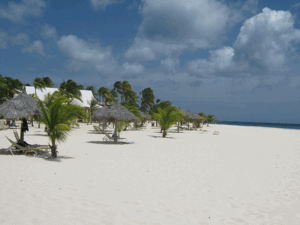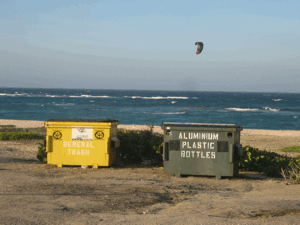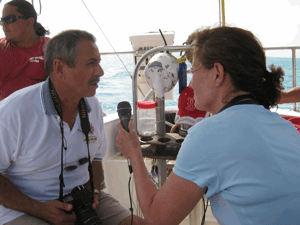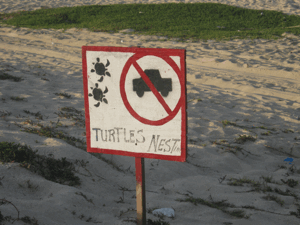Greening Aruba
Air Date: Week of November 5, 2010
 |
The Caribbean island Aruba is growing at a fast pace. And now a new green movement has emerged to make sure that rapid development doesn't come at the expense of the environment. As producer Pippin Ross reports, the movement was spearheaded by a hotel owner who teamed up with the government to show that being a steward for the environment can be profitable.
Transcript
CURWOOD: Okay, so you’re thinking about getting away from the cold this winter? Well, reporter Pippin Ross has a green destination to suggest: Aruba. This Caribbean island off the coast of Venezuela is basically a barren rock about twenty miles long - that doesn’t even have a river. But Aruba does have splendid beaches, consistent sun and exciting dives to shipwrecks and coral reefs. Tourism has recently grown so fast on Aruba that authorities are a putting a moratorium on new hotel construction while developing a green plan. But you don’t have to wait to sample the eco-accommodations offered by a hotelier who is leading the sustainability effort. Here’s Pippin’s report from her trip.
[BIRD SOUNDS, BEACH NOISES]
WOMAN 1: Okay, welcome! This morning, we are here at the Sand Bar gathered together for our beach clean-up.
ROSS: At the upscale Bucuti Beach resort in Aruba, guests are getting instructions on the beach clean-up they’re asked to be part of during their stay.
WOMAN 2: We have our equipment here— plastic bags, bottles of water, some clippers…
ROSS: The visitors are volunteering to help clean the beach even though they’re paying at least $260 a night to stay at the plush resort.
WOMAN 2: Who would leave trash on this beautiful beach?
WOMAN 3: People are people and we’re staying at a green hotel so what the heck! We might as well get in the rhythm with it…Okay…

Beach-goers are encouraged to recycle. (Photo: Phil Austin)
ROSS: The 104 room hotel recycles nearly everything and doesn’t use industrial strength commercial cleaners. Instead, they clean with what housekeeper Agnes DePalm calls the strongest cleaning products of all.
DEPALM: Just simple kitchen vinegar that we use, together with baking soda. When you combine those two products together and put in the drains, it cleans up the drain.
ROSS: The resorts’ environmental sensitivity isn’t part of the current hotel trend to ‘Go Green’ in ways like urging guests to hang onto their towels for another day. Bucuti Beach Resort’s extreme green started about 25 years ago when Aruban local Ewald Beimans got a three million dollar loan from the Dutch Government to build one of Aruba’s first hotels. At the time, the island’s primary business, an oil refinery, was shutting down and attracting tourists seemed the only economic hope. Beimans launched his swank, beachfront hotel by hanging a coil of copper piping he found at the dump up on the roof.

Producer Pippin Ross interviews Bucut Beach Resort owner Ewald Beimans. Beimans was instrumental in launching environmental initiatives on Aruba. (Photo: Phil Austin)
BEIMANS: and I attached it to hoses and I laid it in the sun, and that heated the water…
ROSS: Going solar on the desert–like island was easy. But water is precious, and expensive. To give his hotel customers the comfort they demand for his prices, Beimans designed bathrooms that use about a quarter of the water consumed in hotel toilets, sinks, and showers…
[SHOWER SOUND]
BEIMANS: It’s taking in air, converting it to pressure, and therefore you get less water and more air in the water and you have the impression that you’re doing very well but it uses probably about 50 to 60 percent less water per minute than a conventional shower.
ROSS: Water the hotel reuses.
BEIMANS: This is distilled seawater, it’s extremely costly to produce, so why waste it? The shower and basin goes into a tank. It is then recycled and dispersed in the gardens for the wonderful lawn that you have down there. No cost.
ROSS: Each room has a sensor that turns off lights and air conditioning when no one’s around. To avoid plastic, the morning newspaper is hung from old pillowcases redesigned into bags. In the restaurants, straws are only given on request, and any leftover food is composted, or given away. What Ewald Beimans never expected, is how much money being green saves.

The eco-friendly Bucuti Beach Resort is located on Eagle Beach in Aruba. (Photo: Phil Austin)
BEIMANS: I’ll give you an example: We had a dramatic increase couple of years ago because of energy costs went up. Well, our energy bill has increased minimally. And so therefore, I didn’t have to raise my rates. I didn’t have to put in an energy surcharge.
ROSS: Every other hotel on the island did. The problem, says James Hepple, president of the Aruba Hotel and Tourism Association, is that the recession is making most resorts balk at the investment required to go green in ways more significant than washing fewer towels.
HEPPLE: The resistance is probably more from the hotels saying to the customers it hasn’t proven to them to be a great marketing advantage at this particular time.
ROSS: Frustrated by the other hotels hesitation to go green, Beimans’ actively attends conventions where he lectures Caribbean hotel owners on how investing a million dollars now on a solar, water and waste redesign will be repaid in about three to four years.
BEIMANS: So what this message is to the hoteliers is if you don’t jump on the bandwagon of the environmental journey, eventually you’re going to be out of business.
ROSS: His decade long message-pushing is working. In the last 3 years, the Hyatt, the Westin and 5 other hotels on Aruba have all become Green Globe Certified. That means they satisfied 21 conditions created for the hotel industry at the 1992 United Nations Earth Summit. Beimans’ environmental movement is also backed by many locals. Last year, three quarters of Aruba’s pro-development government was voted out of office and replaced with a new regime promising to do whatever is needed to prevent the tourist trade from trashing the island. Tiko is a tour guide who doesn’t hesitate to let visitors riding his van know the locals have had enough.

A community effort in Aruba aims to protect nesting sea turtles. (Photo: Phil Austin)
TIKO: Everything we lose! We lose all the nature of the island. As a tour guide, we don’t agree with this, what they did in the last 15 years to the island of Aruba.
ROSS: Hotels consume about 60 percent of the island’s resources. To control that, the government has imposed a two year moratorium on any new hotels. Minister of Tourism, Otmar Oduber, says there’s also a plan in the works to require that a percentage of hotel profit go to funding alternative energy and infrastructure.
ODUBER: So, the contribution of the hotels and the private sector, I think, has the space and opportunity to be better than it is right now.
ROSS: Several hotels have offered to invest in the island’s expanding wind-power in the hope that doing so can be voluntary, and not law.
[SOUND WAVES]
Aruba’s green hotels are already being booked for this winter’s high tourist season. The Bucuti Beach resort has sustained the island’s highest occupancy rate for ten years. There’s no exact data on why, but Ewald Biemans believes it’s because more and more people like to take a vacation without leaving a big footprint. For Living on Earth, I’m Pippin Ross.
[OCEAN WAVES]
Links
Living on Earth wants to hear from you!
Living on Earth
62 Calef Highway, Suite 212
Lee, NH 03861
Telephone: 617-287-4121
E-mail: comments@loe.org
Newsletter [Click here]
Donate to Living on Earth!
Living on Earth is an independent media program and relies entirely on contributions from listeners and institutions supporting public service. Please donate now to preserve an independent environmental voice.
NewsletterLiving on Earth offers a weekly delivery of the show's rundown to your mailbox. Sign up for our newsletter today!
 Sailors For The Sea: Be the change you want to sea.
Sailors For The Sea: Be the change you want to sea.
 The Grantham Foundation for the Protection of the Environment: Committed to protecting and improving the health of the global environment.
The Grantham Foundation for the Protection of the Environment: Committed to protecting and improving the health of the global environment.
 Contribute to Living on Earth and receive, as our gift to you, an archival print of one of Mark Seth Lender's extraordinary wildlife photographs. Follow the link to see Mark's current collection of photographs.
Contribute to Living on Earth and receive, as our gift to you, an archival print of one of Mark Seth Lender's extraordinary wildlife photographs. Follow the link to see Mark's current collection of photographs.
 Buy a signed copy of Mark Seth Lender's book Smeagull the Seagull & support Living on Earth
Buy a signed copy of Mark Seth Lender's book Smeagull the Seagull & support Living on Earth

